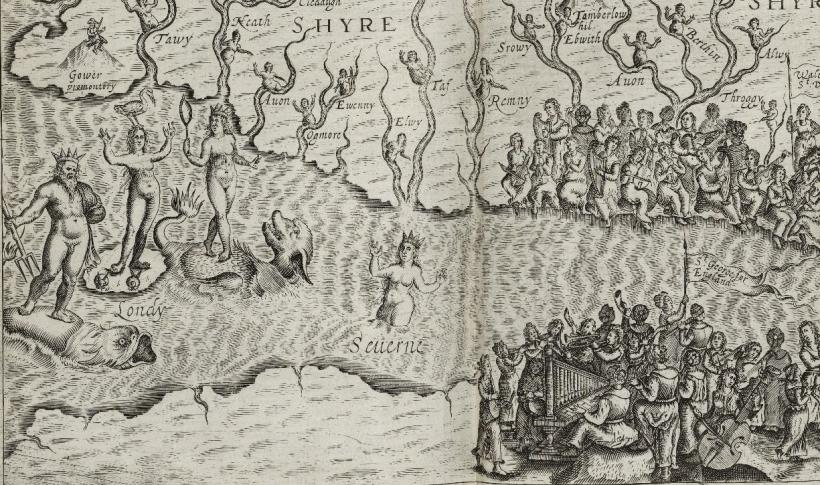Along with King Lear, Poly-Olbion is the major literary work to emerge from James VI and I’s campaign for full political union between Scotland and England. Neither work is unambiguously supportive of the King and his national aspirations; both, nonetheless, represent a united Britain under a single monarch as a kind of ideal. The contemporary debate over Scottish independence carries plenty of echoes of the early-seventeenth-century debate over Anglo-Scottish union, in which Drayton was a leading literary participant. Although Poly-Olbion is unlikely to sway any voter’s choice in Thursday’s referendum, it casts an interesting light on the historical assumptions and tactics of the Yes and No campaigns.
The question of British union is addressed most directly in Song 5, where Severn is called upon to arbitrate in a dispute between the rivers of Wales and England. She counsels them that their struggle over the island of Lundy is moot, since all of Britain will soon be united under one monarch:
By whom three sever’d realms in one shall firmly stand
As Britain-founding Brute first monarchiz’d the land…
Why strive ye then for that, in little time that shall
(As you are all made one) be one unto you all?
Severn refers here to the historical tradition, associated with Geoffrey of Monmouth, that the realm of Britain had been founded in ancient times by the Trojan Brutus. In the later Middle Ages, English kings had invoked this tradition to claim suzerainty over Scotland. After 1603, supporters of James’s union ambitions hailed him as “a second Brute” who would restore the island to its original, unified state. Britain’s first condition, the argument went, must be its right condition. Severn’s prophecy, though ostensibly addressing Anglo-Welsh relations, has unmistakable implications for Scotland as well.
The contemporary contest between Yes Scotland and Better Together presents a mirror image of the Jacobean union debate – a true mirror image, in that the positions of the prior era are both replicated and reversed. Today it is the advocates of Scottish independence, not of British union, who present themselves as striving to restore the nation to its original condition. King James thought a united Britain came before Scotland; Alex Salmond thinks the reverse: “it had 1,000 years as an independent nation before the union.” Celebrating the 700th anniversary of Bannockburn in June 2014, Salmond observed that “Every nation has its iconic touchstones from which it draws its sense of self, and Bannockburn is the wellspring from which modern Scottish nationhood emerged.” By contrast, the Better Together campaign has had little to say about history. That Alastair Darling has refrained from invoking the name of Brutus is understandable; but the paucity of reference to events in the shared British past (at least further back than World War II) is striking. Better Together’s arguments have focused instead on the legal and economic dangers of constitutional change – much like those English and Scottish jurists and MPs who put the brakes on the campaign for closer union four centuries ago.
Better Together has been criticized for its lack of passion, for appealing to Scottish heads rather than Scottish hearts. In short, the unionist campaign has been deemed to lack poetry. If Darling and his allies decide at this late stage that a shot of poetry is needed, they should probably think twice before settling on Poly-Olbion. The poem that sets out to celebrate a united island never quite makes it over the Scottish border. Moreover, Severn’s prophecy aside, Poly-Olbion is remarkably short on images that crystallize the attractions of a united Britain. Rather, as is often remarked, the poem celebrates regional difference and particularity. This, indeed, is part of its timeliness. Whatever the result of the Scottish referendum, the coming years will almost certainly see a movement toward more widespread devolution and regional autonomy in England as well as Scotland and Wales. Poly-Olbion was written for times like these.
Of course, if Better Together is looking for a stirring piece of verse that celebrates a united island, there is an Elizabethan text that does the job better than any poem before or since. I refer to John of Gaunt’s well-known speech in Richard II:
This royal throne of kings, this sceptered isle,
This earth of majesty, this seat of Mars,
This other Eden, demi-paradise,
This fortress built by Nature for herself
Against infection and the hand of war,
This happy breed of men, this little world,
This precious stone set in the silver sea,
Which serves it in the office of a wall,
Or as a moat defensive to a house,
Against the envy of less happier lands,
This blessed plot, this earth, this realm….
But then he goes and spoils it all by adding, “this England.”
Philip Schwyzer

